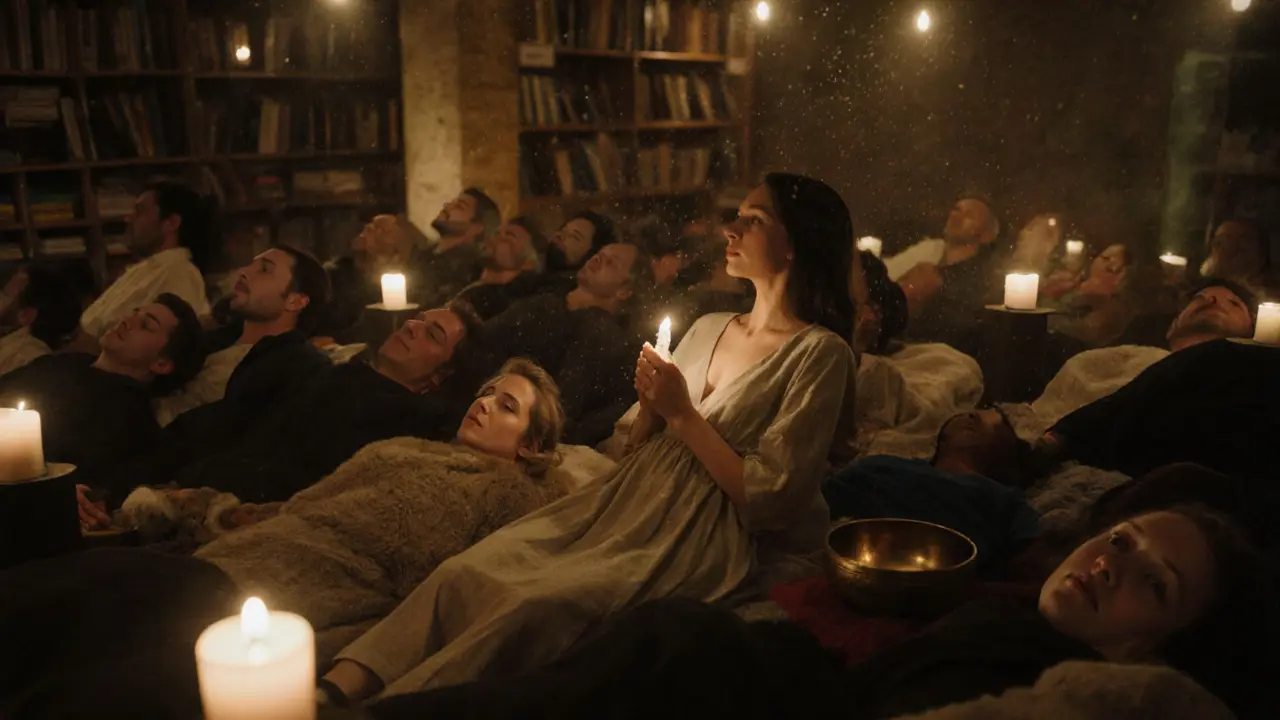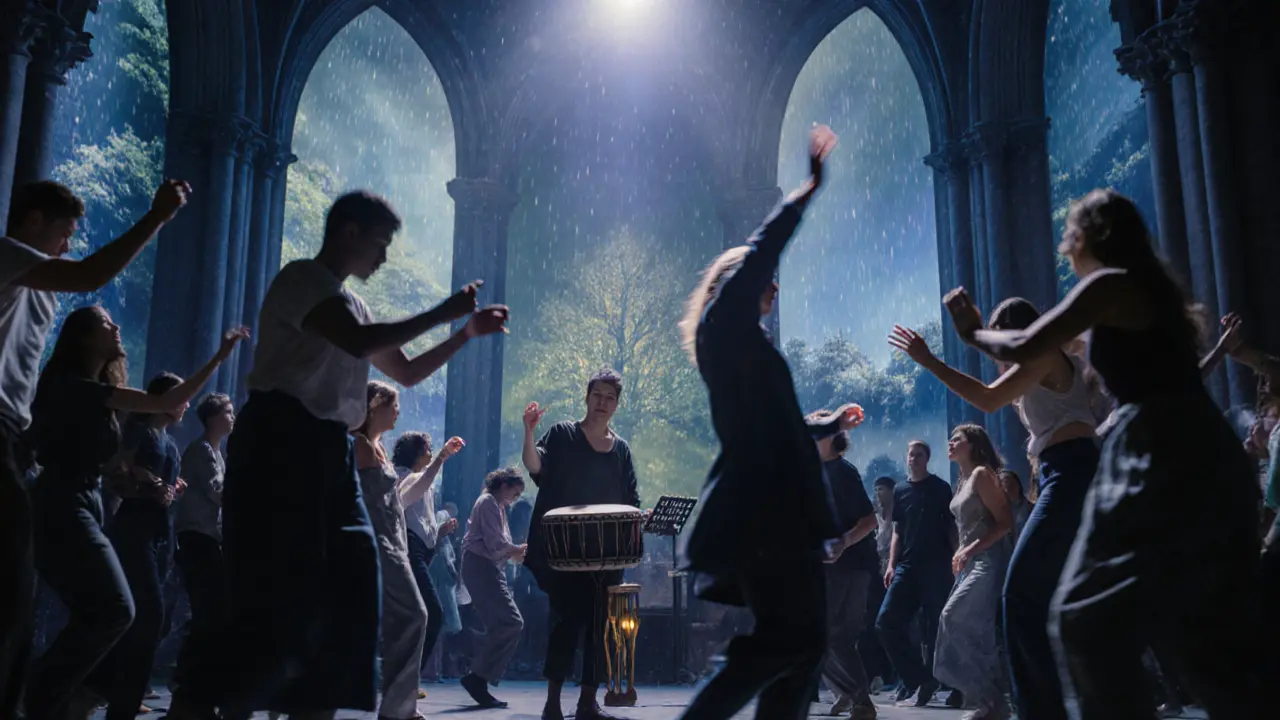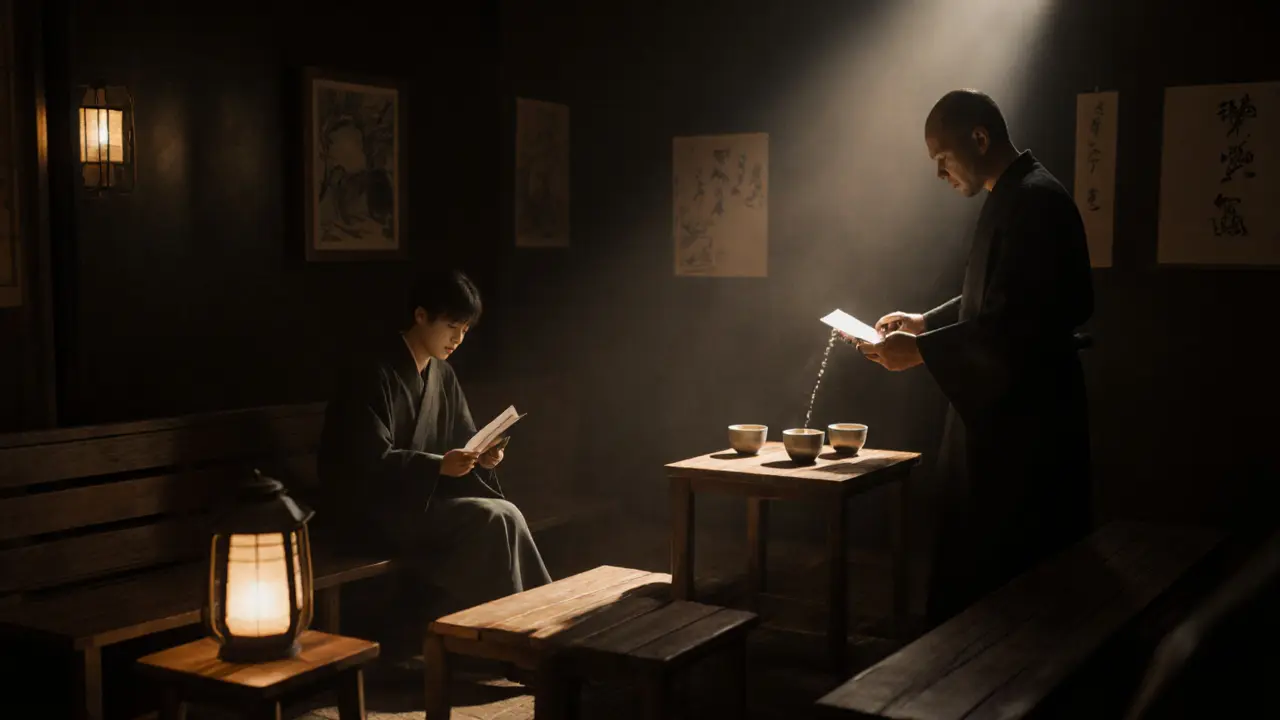London’s nightlife isn’t just about loud clubs and crowded pubs. Beneath the neon and bass drops, there’s a quieter, deeper current-places where people go not to escape, but to connect. To reflect. To feel something real. If you’re looking for nightlife that doesn’t drain you but restores you, London has more than you think.
Quiet Spaces for Deep Listening
Most bars in London are designed to drown out your thoughts. But a few are built to bring them into focus. Shinjuku in Soho isn’t a Japanese bar-it’s a temple of silence. No music. No TVs. Just dim lighting, low wooden benches, and tea served in ceramic bowls. The owner, a former Zen monk from Kyoto, doesn’t serve alcohol. He serves stillness. People come here after midnight to sit alone, read poetry, or talk softly with others who’ve been there before. No one rushes you. No one asks what you do. You’re just welcome.
Across town, in a basement beneath a bookshop in Hackney, The Quiet Room hosts weekly sound baths every Friday. A single gong, Tibetan bowls, and a 30-minute guided breathwork session. No drinks. No phones. Just 40 people lying on wool blankets, listening to frequencies that shake loose the day’s noise. It’s free. You just show up. Some come after work. Others after a breakup. A few come because they’ve read about it in a 1970s occult magazine and thought, ‘Why not?’
Occult Venues with Soul
London has always had a hidden side. The city’s history with mysticism isn’t just folklore-it’s living. At The Alchemical Lounge in Clerkenwell, the cocktails are named after ancient elements: Mercury’s Whisper, Earth’s Memory. The bartender, a former chemist who left academia after a near-death experience, blends herbs, tinctures, and organic spirits with intention. He doesn’t just make drinks-he makes containers for reflection. You can ask him about the symbolism behind each ingredient. He’ll answer. Not because he’s paid to, but because he believes in the medicine of ritual.
Downstairs from a vintage clothing store in Camden, The Lantern is a candlelit space where tarot readers, poets, and musicians rotate nights. No cover charge. No drinks sold-just donations in a ceramic jar. On Tuesdays, a woman named Elara reads tarot using a deck she painted herself during a three-month retreat in the Scottish Highlands. She doesn’t predict the future. She asks questions: What are you avoiding? What are you pretending not to hear? People leave crying. Others leave in silence. Both come back.

Drinking with Awareness
Drinking doesn’t have to mean losing yourself. At Still & Co. in Shoreditch, every cocktail is crafted with mindfulness in mind. The menu lists not just ingredients, but intention: ‘For letting go’, ‘For grounding’, ‘For clarity’. The gin is distilled with chamomile and rosemary. The vermouth is infused with frankincense. The bartender will ask you, ‘What are you carrying tonight?’ and then make you something that matches.
They don’t serve shots. They serve sips. Slow. You’re meant to taste each one. There’s no music-just the hum of the fridge and the occasional clink of ice. People come here after therapy. After funerals. After midnight walks through Hyde Park. They don’t talk much. But when they do, it’s honest.
Mindful Dance and Movement
Not all spiritual nights need silence. Sometimes, movement is the prayer. Ecstatic Dance London meets every Saturday at a converted church in Peckham. No DJs. No set playlist. Just a sound healer who plays ambient tones, drum loops, and field recordings of rain and wind. No clothes are required to be specific-just comfortable. No talking. No phones. No judging. People dance alone. Together. Sometimes they cry. Sometimes they laugh. Sometimes they just stand still in the middle of the room, eyes closed, swaying.
It started as a small group of yoga teachers in 2018. Now it draws 150 people a week. Not because it’s trendy. But because it works. One woman told me she came after her mother died. She didn’t know why. She just felt like she needed to move without being watched. She’s been coming every week since.

Midnight Libraries and Silent Cafés
Some nights, the best nightlife isn’t a bar at all. It’s a library open past midnight. The British Library’s Late Night Reading Room lets you sit among ancient manuscripts under soft lamps. No one talks. No one checks their phone. Just the turning of pages and the occasional sigh. You can bring your own tea. You can sit for hours. No one will ask why you’re there.
Similarly, Tea & Stillness in Notting Hill opens at 10 p.m. and serves only herbal infusions-chamomile, lavender, reishi, and ashwagandha. No caffeine. No sugar. No Wi-Fi. Just a quiet corner, a cushion, and a book of Rumi poems on every table. People come here to write letters they’ll never send. To cry without shame. To sit with their grief, their joy, their confusion. And no one rushes them out.
Why This Matters Now
London is one of the most overstimulated cities on earth. We’re bombarded with ads, notifications, and noise. But spiritual seekers aren’t running away from life-they’re running toward presence. They’re looking for spaces where they don’t have to perform. Where they can be tired, confused, broken, or healed-and still be accepted.
These places don’t advertise on Instagram. They don’t have influencers. They grow through word of mouth, through quiet trust, through people who needed them and came back. They’re not about escapism. They’re about return.
If you’ve ever felt lost in a crowd, or too awake at 2 a.m. to sleep but too drained to party-this is your nightlife. It doesn’t shout. It doesn’t demand. It simply waits. And when you’re ready, it’s there.
Can I find alcohol in these spiritual nightlife spots?
Some do, some don’t. Places like The Alchemical Lounge and Still & Co. serve carefully crafted drinks with herbs and intention, but they’re not bars in the traditional sense. Others, like Shinjuku and The Quiet Room, are alcohol-free by design. The focus isn’t on intoxication-it’s on awareness.
Are these places expensive?
Most are surprisingly affordable. The Quiet Room and The Lantern are donation-based. Still & Co. cocktails range from £12-£18. Ecstatic Dance is £10-£15. Even The Alchemical Lounge, with its premium ingredients, doesn’t charge more than £20 per drink. You’re paying for intention, not exclusivity.
Do I need to be spiritual to go to these places?
No. You just need to be human. Many people stumble into these spaces after a bad day, a breakup, or just feeling out of sync. You don’t need to believe in chakras or tarot. You just need to want to sit quietly, move without judgment, or drink something that doesn’t make you feel worse afterward.
Are these places safe for solo visitors?
Yes. These venues are intentionally designed to feel safe. No aggressive energy. No pressure. Staff are trained to notice when someone seems uncomfortable and will quietly check in. Many regulars are solo visitors-artists, nurses, teachers, people recovering from loss. You’re not a stranger here. You’re just someone who hasn’t said hello yet.
What’s the best time to visit these spots?
Midnight to 2 a.m. is when the energy shifts. These places fill up slowly. The real magic happens after the party crowds have gone home. If you want to feel the quiet, arrive after 11 p.m. Don’t go at 8 p.m.-you’ll be the only one, and you’ll miss the rhythm of the space.
Can I bring a friend who’s not into this kind of thing?
You can. But be honest with them. These aren’t places for small talk or taking selfies. If your friend expects loud music or cocktails with umbrellas, they might feel out of place. But if they’re open to silence, movement, or just being with people who aren’t pretending to be okay-they might leave changed.
